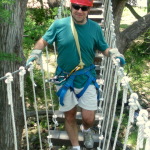DAVE KAPLOWITZ
Interview
Shark Diver, Sax Player, Therapist – You’ve done a lot of different things and done them well. Hard to decide what to ask you first…how about adventure.
Monty – So, shark-diving?! What other sports do you do?
Dave – I tend to go in phases with my hobbies. A few years ago I was training in mixed martial arts. I stopped doing it when I realized that I couldn’t get used to being punched in the face. So now I’m just a fan. I go sky diving every few years. Last year I went surfing in Hawaii for the first time and I loved it. I go to the gym every day and do weights and cardio. I still scuba dive, although not so much with sharks, and mostly with my daughter. I like running and biking on the hike and bike trail. And I love camping and I hope to start backpacking again. It’s been a long time since have done that and I love it.
Monty – Where all have your business and adventure travels taken you?
Dave – Mostly North America and Europe. I was in Alaska a few years ago and that was amazing. I definitely want to go back there, perhaps to the Arctic Circle or Aleutian Islands. I went to Stromboli in the Aeolian Islands and climbed an active volcano. Now that was cool. I did a whale shark research expedition in Mexico a number of years ago. Being face to face with such beautiful graceful animals was transcendent. So many fun things. I’ll stop there.
Monty – What was your most impressive adventurous experience?
Dave – Let me give you three of my favorites. Probably number one was cage diving with Great Whites in South Africa. There is nothing like being up close and personal with one of the baddest apex predators in the ocean. Being on an active volcano on Stromboli was very moving. And my recent dive trip to Cozumel with Nikki, my 20 year-old daughter, was amazing. I love night diving and we did a night dive where we saw so much sea life. The dive master, who has done thousands of dives, said it was his best night dive ever. I have done just over 100 dives and I completely agreed!
Monty – You founded High Tech Media, which included Pamela and me. What did you find the most rewarding aspect of filmmaking, and what the most challenging?
Dave – I have always loved film and it was a lot of fun to be involved in that industry. I love the creative process of imagining something and bringing it from concept to finished product. The most challenging part is that it is a ton of very hard work, both physically and emotionally. I don’t know how you did it for so many years, Monty. These days I’d rather focus my time and energy on my clinical work.
Monty – What inspired you to become a therapist?
Dave – After about 20 years in the tech industry I knew I wanted a change but I didn’t know what I wanted to do. I knew it was going to be a big change that was going to require me to go back to school and it took me two years to figure it out. I looked back and realized that I had been in therapy on and off my entire life and how much of an influence it had on me. It seemed interesting and stimulating and I figured I would give grad school a try and here I am fully licensed with a thriving practice.
Monty – Relationships…everybody’s got them in one way or another, not everybody’s good at them. In your work as a therapist what common patterns of problems do you find?
Dave – Probably the biggest thing I notice every day in my work is how our early unconscious patterns play out in our relationships. We think we are making conscious choices and it is our rational selves that are having relationships. But it is our unconscious, emotional, unreality selves that are running the show completely. Fortunately, there are ways to start to understand and gain some mastery over those young primitive parts of ourselves. Freud said “What was once Id should now become Ego” or something like that. I agree with him.
Monty – How is technology affecting relationships, positively or negatively?
Dave – It’s a mixed bag, like most things, but it is trending negative. On the positive side, having more ways to communicate is better. The voice quality on my cell phone is terrible, but I love being able to keep it in my pocket so I can call someone, have them call me, or consult Google whenever I want. But relationships take time to develop and nurture and all this tech is causing us to go faster. Relationships are something that need to be savored, fussed over, and nurtured slowly. We are wired for relationships and that wiring has taken millions of years to develop. We’ll see how things shake out.
Monty – Tell us what your two lovely daughters are doing these days?
Dave – Nikki, my younger daughter is studying design at Parsons in NYC. It is wonderful to see her developing as an artist and an adult. April is finishing up her senior year at Reed College and will be graduating this May. She’s already got a job on Wall Street lined up and will be starting this summer after some international travel. April and Nikki are planning on getting an apartment together – they love and support each other so well. Seeing them grow and develop is extremely rewarding and stands as probably my greatest achievement in life.
Monty – When and how did you pursue your musical interests? Are you playing these days?
Dave – I started playing flute when I was in fourth grade and over the years have added clarinet, saxophone, guitar, and keyboards. My main instrument is tenor saxophone. I go in and out with music. I’m in a band called “In The Pocket” but we don’t play much these days. I pick up my horn every once in a while when I feel inspired and it’s good to know that I still remember which end to blow into.
Monty – You have a background in science, right? How has that affected other parts of your life?
Dave – Early on I studied science and math. I learned computer programming when I was 12. My undergrad was in Electrical Engineering which is applied science. I like specificity, numbers, statistics and understanding how things work. Being a techie has helped me to use the Internet to build my therapy practice – I am my own IT department, which includes managing my web sites and my electronic records. When I studied family systems theory in graduate school that was a natural extension of what I knew about electrical systems.
Part of what I do in my clinical work is help people solve problems and I learned a lot about causality from my background in tech. Things are not always what they seem and it is important to gather data and dig. It takes a certain patience, discipline, and tenacity. But these days I am much more interested in people than in technology.
Monty – The Maker Movement is growing exponentially. Do you think it’s advantageous for young people to get training in science, technology, engineering, and math?
Dave – I think there are two questions here, Monty. The first one is about the Maker Movement and the second is a larger question about a STEM education.
The Maker Movement is more about using technology to make cool things than tech itself. You don’t have to understand how it works to make it work. You can build something using a 3D printer without understanding exactly how 3D printing works, just like you can drive a car without understanding how a motor works. Of course, knowing how things work under the covers is better, but you don’t have to which is how most people use technology these days.
As far as getting STEM training, I think it is essential, particularly now. We live in an increasingly complex technological world and being able to make decisions requires an understanding of the world we live in. I don’t want to get up on my soap box too much, but there are segments of our society that are ideologically and profoundly anti-science. Man-made climate change is a scientific reality and the longer we keep our heads in the sand and deny it, the worse off we will be in the long run. I can deny the existence of gravity as long as I want, but a big thing falling on me will hurt no matter what I believe. Climate change is one big rock headed straight for civilization. That’s just one big example, there are thousands more.
Monty – You were doing international tech business development some years ago. Please tell us a bit about what you were doing. What’s the biggest surprise to you about how the tech world has developed. What do have now that you had not imagined back then? What did you see coming that just hasn’t worked out?
Dave – That was at the end of my tech career, during the last few years of my tenure at AMD. At the time, AMD was only building one part of the PC and we had to work with hardware and software companies to ensure that their stuff and our stuff would work together well and work together efficiently. I think I would need a power point presentation to fully explain what I did, but some of the companies I worked with were Microsoft, Creative Labs, Crytek and Electronic Arts. It was a lot of fun.
I have been out of the tech world for about 8 years and my predictive powers only extend to maybe 2 or 3 years out, so much of what is going on today would have been a surprise to me 10 years ago. I never saw social media coming. I knew that Microsoft would lose its relevance some day, I didn’t imagine they would so miss the boat on Mobile. One of my biggest misses was when the iPhone came out; I just saw it as a smart phone with a touch screen and what’s the big deal about that??? Well, it turned out to be a really big deal. I could go on and on, but I’d just embarrass myself further. And I’m drawing a blank on things that I thought would be awesome but flopped. Maybe that is my mind playing tricks on me, but I’ll have to get back to you on that one, Monty.
Monty – Congratulations on your new position as President-Elect of the Austin Group Psychotherapy Society. What will you be doing with them?
Dave – Thanks, Monty. AGPS is the local chapter of the American Group Psychotherapy Association. I have been on the board for a little over two years now and my new role is a natural progression of what I have been doing. I am heading up development of a new web site that will take us into the future – its coming along well.
As President-Elect I am in learning mode and am supporting the President in running the organization. We exist to promote group therapy in the Austin area which basically means putting on conferences, workshops and other educational and social activities. We are working to do more outreach to the universities, agencies and other professional organizations. Next year and the following year I’ll be President which should be fun. I get a lot out of it personally, but to a large extent this is about giving back to the community. It’s a great honor to be chosen by the membership for this role.
I also want to add that I am on my fourth year on the board of the Austin Association for Marriage and Family Therapy. That’s my other professional home and I have been a member for years back to when I was a grad student. Working on the Austin AMFT board has been very rewarding and I have gotten to know a number of really wonderful people and great therapists.
Monty – As a marketing consultant, what advice do you have for entrepreneurs?
Dave – First let me say that my focus is on my clinical work with individuals, couples and groups, helping people have happier and more satisfying relationships. That is how I like to spend most of my working hours. But I occasionally do marketing consultation if I think there is a good fit.
As far as marketing advice goes, I always fall back on something I learned very early in my career from some marketing genius, I can’t remember his name. He said “Know who you are selling to, what they want, and how you are going to give it to them”. It means ruthlessly focusing on your target market. Most companies don’t actually know who they are selling to and why the customer is buying. Know your customer, know yourself, and know how to deliver.
Apple is brilliant, or at least used to be when Big Steve was around, at knowing what people wanted before they knew themselves. The rest of us mortals have to talk to people and figure out what they are telling us about their n eeds. One cool thing about my job is that it involves talking to people every day and so I get to think about their evolving needs all the time.
eeds. One cool thing about my job is that it involves talking to people every day and so I get to think about their evolving needs all the time.
Monty – As a person with many talents, what advice would you give others who find it difficult to pursue multiple interests and abilities?
Dave – Whether you are good at a few things or many things I like what Joseph Campbell says: “Follow Your Bliss”. Figure out what you love, do it well, and the money will come. Just make sure it is something relevant.
Monty – What do you like best about living in Austin?
Dave – Austin is just amazing. Don’t forget, Monty, that you were instrumental in my decision to come to Texas and eventually make it to Austin. I have been in Austin for over 20 years and it has been very gratifying seeing Austin change and me change with it. Austin was a great place to build my career in tech and it was very good to me professionally and financially.
Now that I am in the mental health field, Austin is very therapy-friendly and I have a lot of clients that have relocated here from elsewhere so I am benefiting from the growth. And Austin is just so progressive politically. I love the hike and bike trail and the new boardwalk is really stunning and a tribute to the city. I have a great network of colleagues and friends and I can’t imagine leaving. Austin has it all for me!
Personal web site: http://marriagecounselingaustin.com/
Article http://marriagecounselingaustin.com/what-is-love/.
Band: https://myspace.com/itpband/music/songs
AGPS: http://austingroups.org/
Austin AMFT: http://www.austinamft.org/


